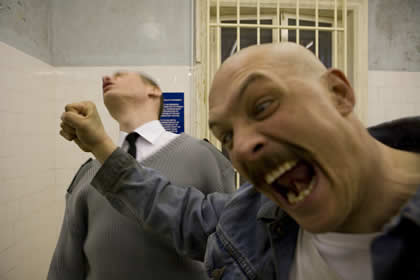In 1974, a hot headed 19-year-old named Michael Peterson (Tom Hardy, in a blazing, transformative performance) decided he wanted to make a name for himself and so, with a homemade sawed-off shotgun and a head full of dreams he attempted to rob a post office. After making off with only 26.18 (British Pounds), he was swiftly apprehended and originally sentenced to seven years in jail, Peterson has subsequently been behind bars for 34 years, 30 of which have been spent in solitary confinement. During that time, Michael Petersen, the boy, faded away and ‘Charles Bronson,’ his superstar alter ego, took center stage…
With the same brutal yet operatic flair he brought to his previous films, “The Pusher Trilogy,” director Nicolas Winding Refn gets inside the mind of Bronson, and delivers not only a portrait of an artist bereft of an outlet, but a scathing indictment of celebrity culture as well.
Bijan Tehrani: How did you first encounter the subject of Bronson?
Nicolas Winding Refn: I actually encountered it by accident while I was in the process of preparing my Valhalla film. The producer of the film, who has also distributed all of my films in the UK, called and told me a story about this man named Bronson who was Britain’s  most famous and dangerous prisoner. At first I wasn’t too interested in doing the film but the story was so intriguing and I knew that doing a prison movie would present a great challenge. When I further researched the story I saw that it had the potential to make a very interesting and operatic film. But I realized that at the time I didn’t have the tools to make a film about an individual who wanted to escape inwards rather than outwards. It’s basically a film about a man who wants to be famous and like an allegory for an artist, he needs a stage to become famous at and he finds that in prison.
most famous and dangerous prisoner. At first I wasn’t too interested in doing the film but the story was so intriguing and I knew that doing a prison movie would present a great challenge. When I further researched the story I saw that it had the potential to make a very interesting and operatic film. But I realized that at the time I didn’t have the tools to make a film about an individual who wanted to escape inwards rather than outwards. It’s basically a film about a man who wants to be famous and like an allegory for an artist, he needs a stage to become famous at and he finds that in prison.
Bijan: How close is this film to the real life events?
Nicolas: I didn’t stay too close to reality as I pick and chose different aspects of Peterson’s life. I wasn’t trying to make a biopic about Michael Peterson; I was rather trying to make a film about the concept of him becoming Charlie Bronson, so I had to take a lot of artistic decisions.
Bijan: Did you get to meet him in person?
Nicolas: No I never met him person, I didn’t really have an interest in meeting him because I was making a movie about him and his transformation, so it was more about my interpretation.
Bijan: Did you actually visit the real-life locations to get inspiration for the film or were the locations based on your own interpretation and imagination?
Nicolas: We only had a million dollars to shoot the movie so I didn’t have the opportunity to visit the locations for inspiration, so many of the visuals were based on my own interpretation.
Bijan: Were the actors allowed to improvise or were they instructed to stay loyal to the script.
Nicolas: I tend to have very thorough and structured screenplays, but I also shoot my films in chronological order, which allows the actors and I to go on a very personal journey. But mostly they stay loyal to the script.
Bijan: How long did it take to develop this screenplay?
Nicolas: It took us about two months to come up with the screenplay and we were constantly changing the script as we were shooting.
Bijan: How did you come up with the visual style of the film?
Nicolas: I wanted to shoot an opera and I basically wanted to make an anchor film. So I combined those ideas with a very operatic approach, so the look of the film was very controlled and visualized.
 Bijan: How much of the film took shape in the editing room?
Bijan: How much of the film took shape in the editing room?
Nicolas: We played around with a lot of things; some things were birthed in the editing room while some things came together by themselves.
Bijan: Did you compose the music for the film as well?
Nicolas: That was something that we wrote before the production began, we then developed it further as the film progressed.
Bijan: How has been audiences reactions been to Bronson?
Nicolas: The reaction has been very good, thank god.
Bijan: Do you have any future project lined up?
Nicolas: I’m not really sure right now, I might want to make a film in Hollywood or produce a film myself in Asia. I’m going weigh out the next couple of weeks and then decide what we’re going to do.
Bijan: Thanks a lot for your time.

